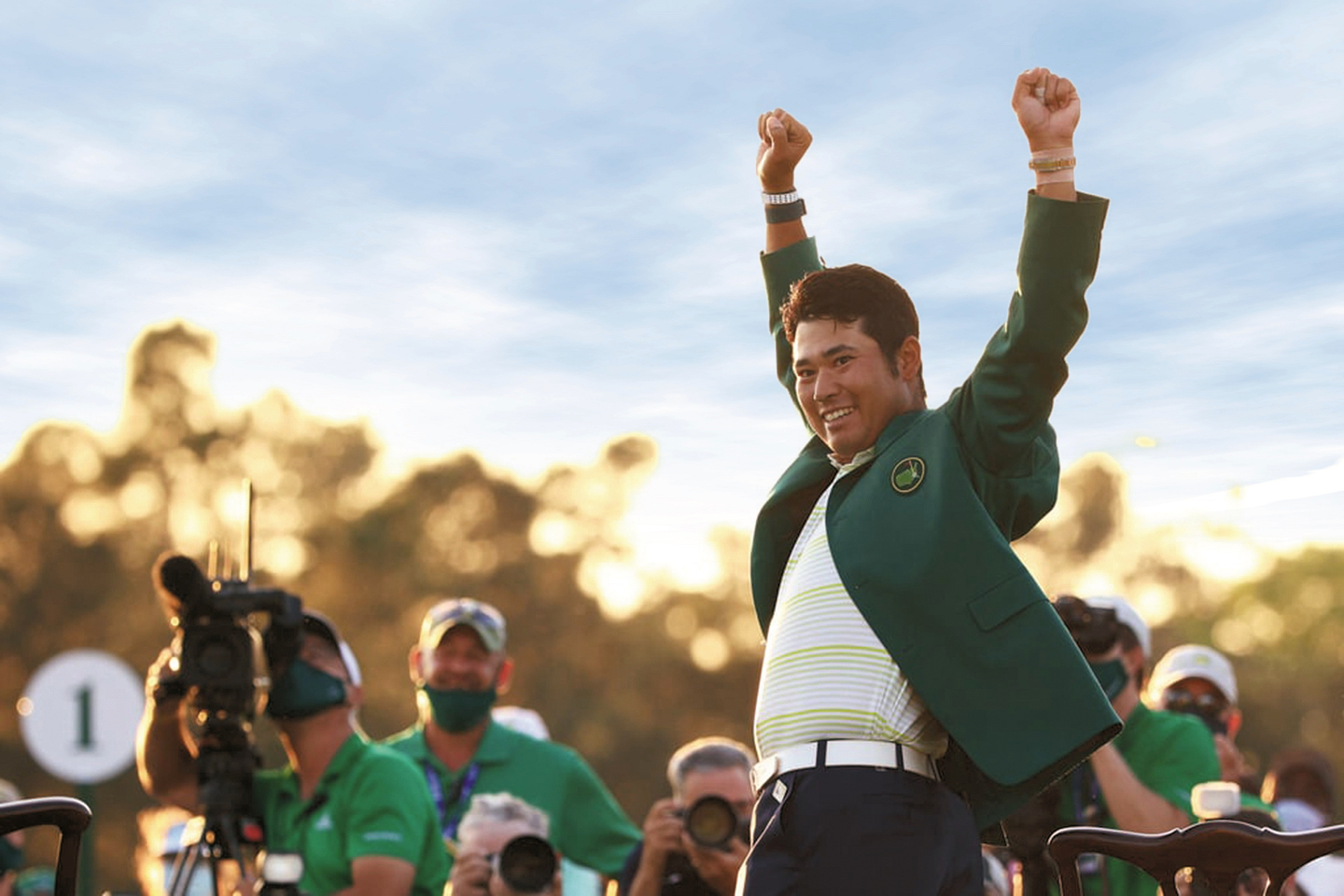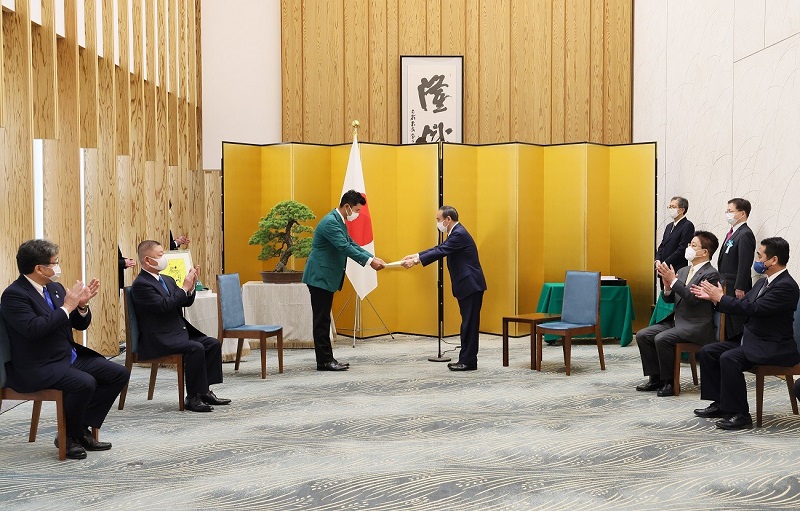
Matsuyama is the first Japanese golfer to claim the major title (Photo: Mike Ehrmann/Getty Images)
It may seem trite to say so, but quite a few multi-denominational prayers were answered around Amen Corner a few Sundays ago.
Back in February, when the gruesome details of Tiger Woods’ car crash emerged, golf in general, and the upcoming US Masters in particular, flinched. Unaccustomed to being collateral damage, Augusta National, host of the game’s fabled showpiece, feared that, without its stricken superstar, there might not be a story to match the blooms of its azaleas.
Already facing an existential threat of bulked-up automatons blasting over time-honoured hazards, the Royal and Ancient game found itself on the back foot. The last thing it needed was for the power hitting of Bryson De Chambeau, who had blitzed and gouged his way to the US Open title the previous September, to reduce its most hallowed contours to pitch and putt irrelevance.
Meanwhile, in Japan, with Covid-19 cases still rising and faced with salvaging a delayed Olympic Games (on which US$15 billion has been spent) without fans, the host nation badly needed a boost to morale.
Cometh the hour, cometh the World No 25. Outside of Japan, Hideki Matsuyama, whose last win was in 2017 and who had had no top 10s since, was a name familiar only to golf aficionados. To the rest of the world, he was very much a 40-1 outsider: less than 1% of the total bet on the tournament was placed on him.
But back home, he was already getting the rockstar treatment, drawing packs of reporters demanding to know what he had for breakfast. As Japan’s top-ranked player competing on the world stage, he has a patriotic following and travels with an entourage. A tour joke is that “he putts for 20”.
The expert view, however, was that he lacked the two main weapons required for taming this treacherous layout: a howitzer off the tee and a laser on the green. A modest 101st in driving distance on the PGA Tour, Matsuyama averages 296.8 yards compared with the 321.1 of first-placed De Chambeau.
With the latter boasting that Augusta was a par 67 (five-under) for him, the Japanese was not even a dark horse. And then, there was Amen Corner where the scenery alone can bring you to your knees. “It plays differently on a Sunday,” they say. It plays very differently when the weight of a nation is on your shoulders.
That was the burden Matsuyama carried after storming to a four-shot overnight lead. After a rain delay on Saturday, he played the last eight holes in six under, recapturing the form that took him to No 2 in the world four years ago.
By then, De Chambeau’s heavy artillery was misfiring and defending champion Dustin Johnson was among a posse of big names who had already missed the cut. Four shots were very handy but, on one famous occasion, six were not enough for Greg Norman.
Fast forward to the middle of the night in East Asia and half of Japan’s 126 million people are waking up to see if their compatriot could cling on. No other clutch moment in sport can compare: as former winner Hale Irwin puts it, “You start to choke at The Masters when you drive through the front gate.”
Undaunted, Matsuyama played as if he had never read such stuff — which he probably had not. He kept his head as all about him were losing theirs. Even when he had duffed his opening drive into the dogwoods and dropped a shot, he remained calm.
179843565_10158045051773161_7928530934268111477_n.jpg

He was enjoying a respite from his home media — Covid-19 restrictions having kept most of them out. He is the strong, silent type anyway, and a common refrain from his compatriots is that while he is a man of few words in English, he speaks even less Japanese.
His US playing partner, second-placed Xander Schauffele, gnawed away at his lead and there was another moment that had hearts fluttering as the sun was about to rise in his homeland: He found water on the 15th. The lead was now down to two. But when Schauffele responded by rinsing his tee shot at 16, that was pretty much that.
Matsuyama held firm and could even afford to miss on the final green to win more comfortably than the one-stroke margin suggests. As the clinching one-footer dropped, the enormity and significance of the story sank in: It was the most far-reaching golf had known in years.
In Japan, newspapers printed special editions, golf-related stocks surged and broadcasters held back tears on live TV. ESPN’s Andy North claimed the win could be worth “a billion dollars”. Some said Matsuyama had “saved the Masters!”, others opted for the Olympics. Take your pick but by becoming the first Japanese (and first Asian) to don the Green Jacket, he had answered the prayers of a very wide spectrum of interested parties.
Some of the hype was as over the top as Matsuyama was understated. Compared with iconic Masters’ moments such as Seve Ballesteros’s fist pumps and Tiger’s roars, he looked as if he was a touch embarrassed about needing two putts to get down from six feet.
It was all very dignified and very Japanese, and then came another historic first. In 85 years, Augusta had seen plenty of deference but never had a caddie doff his cap and bow to the course as Matsuyama’s faithful Shota Hayafuji did.
Even with the green jacket (size 42L) a perfect fit and the trophy in his hands, the new champion had to be cajoled into holding it aloft. He then punched the air with a tear in his eye. In a low murmur via his interpreter, he had already spoken of what it could mean: “I’m glad to be able to open the floodgates, hopefully, and many more will follow me.”
For Japan, it was the fulfilment of a long-held ambition that had become a craving. Television commentator Rex Kuramoto said: “We’ve been waiting 10, 30, 40 years for this. It will be huge.” The pertinent question is: What took so long? A Japanese woman, Hisako Higuchi, won a major in 1977 and South Korea’s YE Yang became the first Asian man to do so when he edged Tiger by three strokes at the USPGA in 2009. Don’t even mention the colonisation of the sport by South Korea’s women.
The drought is all the more remarkable for a golf-crazy country. It is the second largest golf industry in the world and boasts 2,500 courses (half of Asia’s total), one for every 57,000 people. And then there are the ubiquitous driving ranges, often multilevel, whose tall green nets mark every suburban skyline. Many regulars never get to play on a course.
One obvious reason is that the sheer cost of playing once put it out of the reach of the average worker. Its corporate culture was another — not least the habit of playing nine holes, having a sit-down meal and carrying on for another nine to make it a day-long affair.
The number of players had been declining in recent years by almost 40% since 1996 — from 12 million to 7.5 million at the latest count — according to Tokyo Shimbun. But this has reversed partly thanks to the virus and change in the culture. Playing in the open air caught on during the pandemic and has coincided with a loosening of rules and lowering of green fees. Courses where a round costs less than US$100 are expecting to catch a new wave.
The Japanese love to see their sportsmen compete on the world stage and it would be unthinkable if they did not rally round their golfers now and encourage kids to emulate Matsuyama. Nor was the joy confined to Japan. PGA Tour veteran Kevin Na, who was born in South Korea but has US citizenship, was ecstatic. He said: “It’s a big day for the Asian golf world. I think there’s many more to come. This won’t be the end.”
Mindful of an alarming spike in hate crimes in the US, Asian-American Sam Yip wrote in The Guardian, “The only thing we as a community can do collectively is continue to celebrate Asian success stories like Matsuyama’s, no matter how rarely they come”. Far-reaching indeed.
But it is at home where the real impact will be felt. Whether or not the Olympics goes ahead, the hosts now have an alternative story and a new national hero. As we saw with the rugby World Cup, when Japan gets behind something, they really give it a shove.
None other than Tiger himself recognised the scale of it. "Making Japan proud Hideki," he tweeted. "Congratulations on such a huge accomplishment for you and your country. This historical @TheMasters win will impact the entire golf world."
So, Augusta had another landmark chapter to add to its fabled history. Like hundreds of other courses around the globe, it could cancel the designers and call off the diggers — for now. Ditto golf’s rulers and tampering with the ball.
It was also a victory for the weekend golfer everywhere as you do not need to bulk up 25kg and spend three hours a day in the gym to be a champion — as De Chambeau had. His bid to defeat nature with raw power was in smithereens — tied for 46th place 15 shots behind the winner with 17 bogeys and six doubles.
Traditional virtues — stellar iron play and precision on the greens (which Matsuyama had been working on) — had triumphed and the boost will surely see a spike in normal-sized walk-ins from Tokyo to Bali.
But the main beneficiary is Japanese golf. Earlier in the month, 17-year-old Tsubasa Kajitani won the Augusta National Women’s Amateur championship. Which makes Matsuyama’s priceless quip when asked if he had accepted the supreme honour of lighting the Olympic cauldron seem a tad less haughty. He said: “I’ll have to see if it fits into my schedule.”
Unintentional or not, the early signs are that he just might be too busy: after all, he has already lit golf’s blue touchpaper.
This article first appeared on Apr 26, 2021 in The Edge Malaysia.


